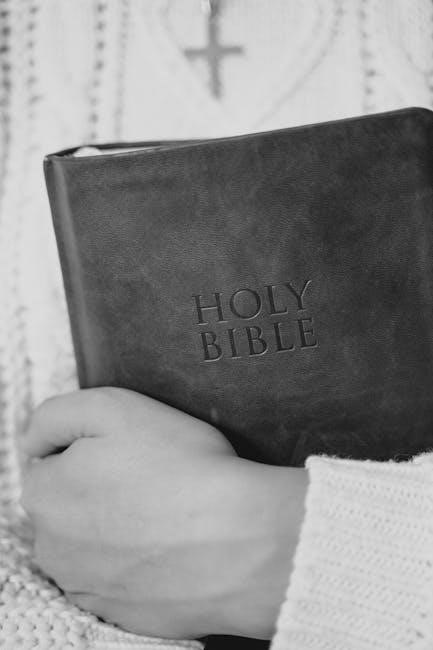The Book of Discipline is a foundational document guiding the governance, doctrine, and polity of the United Methodist Church, available in PDF for easy access.
1.1 Historical Background and Purpose
The Book of Discipline traces its roots to the 1784 edition, evolving over two centuries to guide United Methodist governance, doctrine, and polity. It serves as the official instrument for setting forth the laws and processes by which the church operates, ensuring unity and order. Amended quadrennially by the General Conference, it reflects the church’s ongoing commitment to its mission and principles.
1.2 Structure and Content Overview
The Book of Discipline is structured to provide a comprehensive guide to the church’s doctrine, social principles, and governance. It includes foundational documents, organizational policies, and operational procedures. Available in PDF, it is divided into sections addressing beliefs, rituals, and administrative processes. Regular updates from the General Conference ensure it remains relevant, serving as an essential resource for clergy and laity alike.
Key Features of the Book of Discipline
The Book of Discipline outlines the doctrine, social principles, and governance of the UMC, detailing the roles of clergy and laity in church operations.
2.1 Doctrines and Social Principles
The Book of Discipline articulates the UMC’s core doctrines, rooted in Wesleyan theology, and outlines social principles addressing issues like justice, equality, and human dignity, guiding both individual and collective action within the church.
2.2 Governance and Polity of the UMC
The UMC operates under a connectional governance model, uniting local churches through shared leadership and resources. The Book of Discipline details the structure, including roles of bishops, clergy, and laity, and outlines procedures for decision-making, accountability, and church trials, ensuring a balanced and orderly system of church polity that applies across local, district, and global levels.
2.3 Role of Clergy and Laity
The Book of Discipline defines the roles of clergy and laity in the UMC, emphasizing shared ministry. Clergy are ordained to provide spiritual leadership, preach, and administer sacraments, while laity are called to serve in various ministries, supporting the church’s mission. Both groups work together to fulfill the church’s purpose, with laity often holding key leadership roles in local congregations and beyond.
Accessing the Book of Discipline in PDF Format
The Book of Discipline is available in PDF format through official UMC sources like Cokesbury and the UMC Publishing House, offering easy digital access for study and reference.
3.1 Official Sources for Download
The Book of Discipline in PDF can be downloaded from official UMC sources like Cokesbury and the UMC Publishing House. These platforms offer the 2020/2024 edition for $29.99, ensuring authenticity and compliance with copyright laws. Additionally, the PDF is searchable, making it easier for clergy and laity to reference specific sections. Always verify the source to ensure you’re accessing the official, updated version of the document.
3.2 Copyright and Usage Guidelines
The Book of Discipline PDF is protected by copyright, with rights held by the United Methodist Publishing House. Congregations and official UMC bodies may reproduce up to 1,, provided proper attribution is included. Commercial use requires written permission. Always access the document from authorized sources like Cokesbury or the UMC Publishing House to ensure compliance with copyright laws and guidelines.

The Book of Discipline and Church Law
The Book of Discipline serves as the legal framework for the United Methodist Church, outlining governance, polity, and procedural guidelines to ensure orderly church operations and decision-making processes.
4.1 Legal Framework for Church Operations
The Book of Discipline provides the legal framework for United Methodist Church operations, outlining governance structures, administrative processes, and procedural guidelines. It ensures consistency and accountability across all church levels, from local congregations to global denominational functions, while maintaining unity in mission and practice, as detailed in the PDF version of the document.
4.2 Procedures for Church Trials and Dispute Resolution
The Book of Discipline outlines detailed procedures for church trials and dispute resolution, ensuring fairness and accountability. It provides a structured process for addressing conflicts, adhering to scriptural principles and denominational policies. These guidelines aim to maintain unity and integrity within the church, as specified in the PDF version of the document.
Recent Updates and Controversies
The Book of Discipline has faced debates, particularly over human sexuality and church unity. Recent updates in the 2020/2024 Edition reflect ongoing tensions within the UMC.
5.1 Changes in the 2020/2024 Edition
The 2020/2024 Edition of the Book of Discipline introduces updates on church governance, including new paragraphs like 2553, which provides pathways for congregations to exit the UMC. These changes reflect ongoing efforts to address internal divisions, particularly regarding human sexuality. The edition emphasizes maintaining traditional stances while offering flexibility for departing churches. It also clarifies disciplinary procedures and legal frameworks to ensure compliance with denominational standards.
5.2 Debates on Human Sexuality and Church Unity
Debates over human sexuality remain central to the United Methodist Church’s challenges. The Book of Discipline upholds traditional views on marriage, causing division among members. These tensions have led to splits, with many congregations choosing to leave the denomination. Efforts to maintain unity while addressing differing beliefs continue, reflecting broader societal shifts and theological disagreements within the global church.

The Role of the Book of Discipline in Modern Ministry
The Book of Discipline remains a vital resource for modern ministry, providing guidance on governance, doctrine, and ethical standards. It equips pastors and leaders to navigate contemporary challenges while upholding the church’s mission and values. Available in PDF, it ensures accessibility for clergy and laity alike, fostering unity and informed decision-making across the denomination.
6.1 Guidance for Pastors and Church Leaders
The Book of Discipline serves as a cornerstone for pastors and church leaders, offering clear guidelines on doctrinal integrity, ethical conduct, and administrative practices. It provides structured frameworks for decision-making, ensuring alignment with the UMC’s mission and values. Available in PDF, it enables leaders to access essential policies and procedures efficiently, fostering informed and compassionate ministry in diverse contexts.
6.2 Application in Local Church Settings
The Book of Discipline provides operational guidelines for local churches, ensuring alignment with UMC principles. It addresses worship practices, membership requirements, and community engagement, offering a framework for ethical decision-making. Available in PDF, it equips local congregations to adapt denominational policies to their unique contexts while maintaining doctrinal consistency and fostering spiritual growth within their communities.
Historical Development of the Book of Discipline
The Book of Discipline traces its origins to the 1784 edition, evolving through General Conferences to reflect the UMC’s governance, doctrine, and polity, now accessible as a PDF.
7.1 Evolution from the 1784 Edition
The Book of Discipline has evolved significantly since its 1784 inception, with each General Conference refining its doctrines, polity, and practices. The 2016 and 2020/2024 editions reflect modern updates, maintaining its role as the UMC’s governing document. Now accessible as a PDF, it continues to guide the church’s mission and structure, blending historical roots with contemporary relevance.
7.2 Key Milestones in Its Revision
The Book of Discipline has undergone significant revisions, with notable updates in the 2016 and 2020/2024 editions. Each revision reflects the evolving needs of the church, including updates to social principles and policies on human sexuality. The quadrennial process ensures the document remains relevant, guiding the UMC’s mission and governance effectively. Its availability in PDF format enhances accessibility for modern church leaders and members.

The Book of Discipline and Ecumenical Relations
The Book of Discipline fosters collaboration with other denominations, promoting unity through shared principles and a common mission, while respecting diverse traditions in ecumenical dialogue.
8.1 Interfaith Dialogue and Cooperation
The Book of Discipline emphasizes fostering interfaith dialogue and cooperation, encouraging United Methodists to engage with diverse religious communities. This promotes mutual understanding, shared values, and collaborative efforts in addressing global challenges. Such efforts reflect the church’s commitment to unity and peace, aligning with its teachings on love and respect for all people.
8.2 Global Impact of the UMC’s Disciplinary Practices
The United Methodist Church’s disciplinary practices, outlined in the Book of Discipline, have far-reaching global implications. They influence church policies, mission work, and social justice efforts worldwide. The document’s guidelines on governance and ethics shape the church’s international presence, fostering unity and consistency across diverse cultural contexts while addressing global challenges with a unified Methodist voice and vision.
Education and Training Resources
The UMC provides study guides, online courses, and workshops to enhance understanding of the Book of Discipline. These resources are available in PDF and other formats.
9.1 Study Guides and Educational Materials
The UMC offers comprehensive study guides and educational materials to deepen understanding of the Book of Discipline. These resources, available in PDF and other digital formats, include detailed explanations of doctrines, social principles, and governance. They are designed for clergy, laity, and students to enhance their knowledge and application of the Discipline in local church settings and ministry contexts effectively.
9.2 Online Courses and Workshops
The UMC provides online courses and workshops to explore the Book of Discipline in depth. These resources, often paired with downloadable PDF materials, are designed for clergy and laity to understand and apply the Discipline effectively. Offerings include sessions on governance, doctrine, and social principles, available through platforms like Cokesbury and Discipleship Ministries, fostering ongoing education and spiritual growth.
The Book of Discipline remains essential for guiding the UMC’s mission and governance. Its availability in PDF ensures accessibility, fostering unity and adherence to Methodist principles, while future editions promise continued relevance and adaptation to the evolving needs of the Church.
10.1 The Enduring Importance of the Book of Discipline
The Book of Discipline is a cornerstone of United Methodist governance, outlining doctrine, polity, and practices. Its enduring importance lies in providing a unified framework for the Church’s mission and operations. Available in PDF, it ensures accessibility for clergy and laity, fostering understanding and compliance with Methodist principles. This document remains vital for guiding the Church’s future while honoring its traditions.
10.2 Looking Ahead to Future Editions
Future editions of the Book of Discipline will continue to adapt to the evolving needs of the Church, addressing modern challenges while maintaining core doctrines. The PDF format ensures accessibility and ease of updates. General Conferences will remain central in shaping revisions, ensuring the document stays relevant and unifying for the global United Methodist community.
